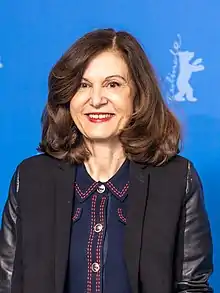Anne Fontaine
Anne Fontaine (born Anne-Fontaine Sibertin-Blanc; 15 July 1959) is a Luxembourger film director, screenwriter, and former actress. She lives and works in France.
Anne Fontaine | |
|---|---|
 Fontaine at the 2020 Berlin International Film Festival | |
| Born | Anne-Fontaine Sibertin-Blanc 15 July 1959 |
| Occupation | Film director, screenwriter, actress |
| Years active | 1980–present |
| Spouse(s) | Philippe Carcassonne |
| Children | 1 |
Life and career
Born Anne-Fontaine Sibertin-Blanc in Luxembourg, sister of actor Jean-Chrétien Sibertin-Blanc, she went as a young child to live in Lisbon,[1] where her father, Antoine Sibertin-Blanc, is a music professor and cathedral organist. In adolescence she moved to Paris and trained in dance with Joseph Russillo[2] while continuing her academic education, including philosophy. Her husband is Philippe Carcassonne, the film producer, and they have an adopted son, Tienne, who was born in Cambodia.
While still dancing, she was picked by Robert Hossein to play Esmeralda in a 1980 theatrical production of The Hunchback of Notre Dame[3] and around this time started to use the name Anne Fontaine. She continued with acting and became known for her roles in comedies like Si ma gueule vous plaît... (1981) and P.R.O.F.S.(1985). An opportunity to be assistant director came with a 1986 stage version of Louis-Ferdinand Céline's Journey to the End of the Night at the Renaud-Barrault theatre.
Fontaine's first project as solo director, Les Histoires d'amour finissent mal... en général (Love Affairs Usually End Badly), won the 1993 Prix Jean Vigo. In 1995, she worked with her brother on the comedy Augustin. Two years later, she wrote and directed the successful Dry Cleaning (Nettoyage à Sec). It won the Best Screenplay award at the 1997 Venice Film Festival and is generally considered a milestone on Fontaine's way to becoming "an important figure in contemporary French cinema".[4]
In 1999 the character Augustin (Jean-Chrétien Sibertin-Blanc) re-appeared in Fontaine's film Augustin, King of Kung-Fu. How I Killed My Father was released in 2001, and Nathalie... followed in 2003. The 2005 film, Entre ses mains was widely described as a thriller: an "intimate thriller" according to Fontaine herself.[5] A third Augustin film, Nouvelle chance (also known as Oh La La) was released in 2006. Then came The Girl From Monaco in 2008 and Coco Before Chanel, her biopic of Coco Chanel, in 2009.
Fontaine's work is not easily categorised, though the phrase "psychological drama" is often used. She told a UK newspaper, "I try to work on my characters' blind side, in a kind of Freudian way: to ask, 'What are the things about themselves that they're unaware of?' I'm fascinated by the irony of fate, when something goes into a skid. All my stories have an element of cruelty in them."[6]
While knowing that the movement of ‘women’s cinema’ worked as a counter to the classical Hollywood system, Fontaine didn't like to identify with this. During an interview in 1998 with Eve-Laure Moros, she stated:
“If people say that ‘Nettoyage a sec’ is a woman's film, I'm very surprised, I don't know what that means... I think that to be a filmmaker, as far as sexuality, it's something that's really de-sexualizing. That is, you become a bizarre thing, when you're directing a film---during the shooting, you're neither a man nor a woman, you're really something strange and very ambivalent.”[7]
Fontaine established herself as a very progressive filmmaker of her time when saying this, establishing that ‘women’s cinema’ should be based on the filmmaker's perspective rather than their gender. This also suggests that classifying and interpreting films in the category of ‘women’s cinema’ is creating bias and exclusivity among the genre in itself, when it should be a network of creation and empowerment, as Fontaine always intended.
Filmography
As filmmaker
As actress
| Year | Title | Role | Notes |
|---|---|---|---|
| 1980 | Les Mystères de Paris | Sarah | TV mini-series |
| 1980 | Tendres Cousines | Justine | |
| 1981 | Si ma gueule vous plaît... | Isabelle | |
| 1982 | Caméra une première | Alba | TV series |
| 1984 | Le Mystérieux Docteur Cornélius | Andrée de Maubreuil | TV mini-series |
| 1985 | Entre chats et loups | Carole Lambert | TV movie |
| 1985 | P.R.O.F.S. | Marite | |
| 1986 | Grand hôtel | Marite | TV series |
| 1987 | Children and the White Whale | Claudine | TV movie |
| 1988 | Carte de presse | Pauline | TV mini-series |
| 1986–1990 | Série rose | Mathilde / Mme Orlova | TV series |
| 1999 | Pas de scandale | Nathalie |
References
- Le Soleil, Canada (10 Feb 2006)
- Libération (9 Jan 2004)
- Libération
- Sexual Politics and "Dry Cleaning" with Directrice Anne Fontaine Archived 20 March 2006 at the Wayback Machine
- Quoted in a review Archived 4 March 2007 at the Wayback Machine of the 2006 Australian French Film Festival
- Daily Telegraph (17 July 2004)
- Ritterbusch, Rachel (2008). "Anne Fontaine and Contemporary Women's Cinema in France". Rocky Mountain Review. 62: 68–81.